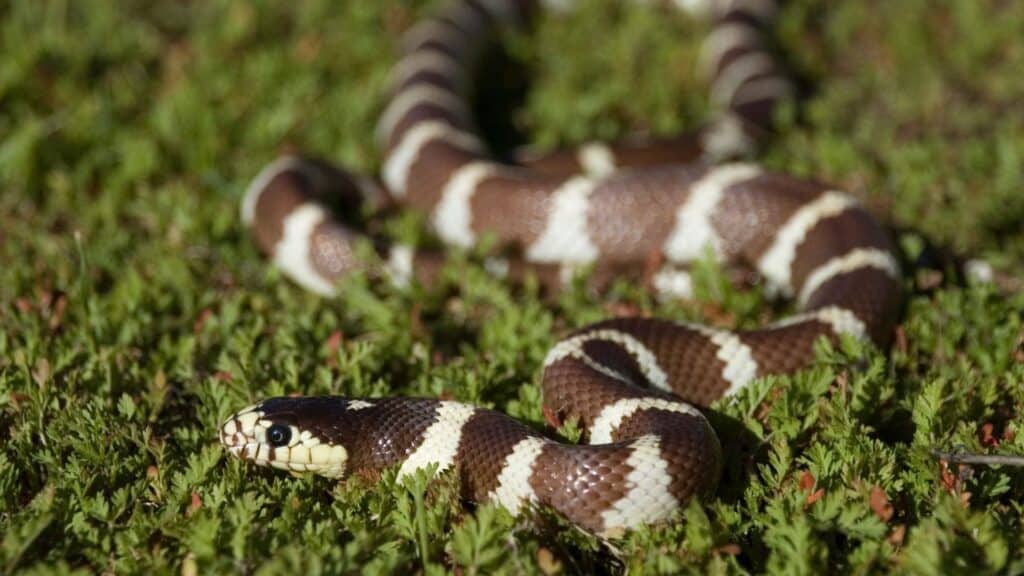 California kingsnakes have reputations of biting more than than other pet snakes. That said, they are also known to have docile temperaments and to be great for handling. So what’s the deal? Do California kingsnakes bite or is this simply a rumor?
California kingsnakes have reputations of biting more than than other pet snakes. That said, they are also known to have docile temperaments and to be great for handling. So what’s the deal? Do California kingsnakes bite or is this simply a rumor?
California Kingsnakes do bite sometimes, but they are non-venomous and are not dangerous. A California kingsnake bite likely won’t cause serious damage to a person other than a few cuts or small punctures.
These passive creatures will only bite when they feel threatened or you smell like prey and do not have fangs or other large teeth. So yes California kingsnakes do bite. However, their bite is typically not something that is going to need medical attention.
That said, I want to cover myself here and say that there might be instances where California kingsnake bites have caused a more serious problem such as infection or something else. That said, their bites are not something snake keepers seem to view as a major problem.
Do California Kingsnakes make good pets even though they have a reputation for biting? They must since they’re one of the most popular captive snakes in the world. Read on to learn more about California Kingsnake bites and how to avoid them when you own one.
What Causes A California Kingsnake To Bite?
California Kingsnakes are not an aggressive species. In the range of snake temperaments, California Kingsnakes could be considered docile. But they still have a reputation for biting because these gentle snakes can become easily flustered and frightened when handled.
Rather than biting out of aggression, these snakes will only bite when they’re hungry or afraid they will be hurt. These snakes are also known to bite if you smell like prey.
In the wild, they are known to eat other snakes and lizards. So if you are keeping other pets your hand might still have their scent when you reach for your kingsnake.
This can even be true if your hand smells like a kingsnake. So the best thing to do to avoid this is to make sure you wash your hands prior to handling.
Do California Kingsnake Bites Hurt?
It does hurt when you get bit by a California Kingsnake, same as it would for you to get bit by any non-venomous snake or lizard of the same size. California Kingsnakes have a series of tiny teeth to hold their prey while they constrict it to death.
California Kingsnakes are known to bite but they do have small teeth. The sensation of these teeth has been compared to a mosquito bite or a bee sting at the worst. If you are bitten by a California Kingsnake, you should do the following:
- Do not pull the snake off your skin if it clamps down. This could break the teeth of the snake or injure its mouth and head. Remember that if a California Kingsnake bites you, this is a sign that it’s frightened. Don’t frighten it further by shouting or flailing it around, or it’s likely to bite down harder. These snakes are constrictors and will double down on biting if they are scared.
- Wait for the snake to release you. If the snake relaxes, this shouldn’t take more than a few seconds. Once the snake lets go, gently put it back in its enclosure.
- Check out your bite wound. Chances are you won’t have more than a few shallow punctures or scratches since the teeth of the California Kingsnake are so small. There shouldn’t be much pain, but if there is any, it should only be minor.
- Wash your hands and the bite with antibacterial soap. For most bites, this should be enough to ensure that the bite does not become infected, but if you’re worried, you can also apply an antibacterial ointment (such as Neosporin) and a bandage to protect the bite from the air.
Even if you get bit by a California Kingsnake, it shouldn’t be a catastrophic event. Getting bit by this snake is no worse than getting bit by a mouse or a hamster.
Do California Kingsnakes Have Fangs?
California Kingsnakes don’t have fangs. Fangs are hollow teeth that snakes have that are designed for injecting venom into their prey. But California Kingsnakes are not venomous, so they don’t need fangs. Instead, California Kingsnakes have rows of small teeth that hold their prey while they suffocate them by crushing them in their coils.
Are California Kingsnake Bites Dangerous?
California Kingsnake bites are not typically considered dangerous. These bites could become infected if left untreated, like any other break in the skin, but they are rarely a medical danger.
The real danger of being bit by your California Kingsnake is that it can make you jumpy and nervous about handling the snake again, making your snake jumpy and nervous and more likely to bite you again when agitated.
If you get bit by your California Kingsnake, mark it up to a learning experience and maybe dial back handling the snake until it’s more used to you. But it’s important not to act agitated or nervous when you’re trying to handle your snake. Remember that animals read a lot into a human’s body language, and if you’re flustered, you’re going to make your California Kingsnake flustered, too.
Many problems with handling exotic animals can be resolved simply by trying to see the world from the animal’s perspective before you handle it.
Remember, to a California Kingsnake, you are big, easily capable of killing it, and it doesn’t know whether you want to eat it or not. You should keep all handling gentle and slowly handle your snake more and more often until it trusts you.
Does the California Kingsnake Defend Itself in Other Ways Than Biting?
California Kingsnakes don’t use just their teeth to defend themselves. This snake has several clever ways to protect itself from predators. Here are some of the things a California Kingsnake will do to protect itself other than biting, including the following (Source: Live Science):
- Excrete musk
- Expel feces
- Curl up in a defensive ball
- Shaking his tail to imitate a rattlesnake
The California Kingsnake will usually not bite unless it doesn’t see any other choice. If you see your California Kingsnake curling up in a ball or shaking its tail while it is still in its tank before you even try to handle it, that’s a sign that the snake is already agitated and can’t be safely handled. California Kingsnakes are easily frightened, so it may take some time for it to become tame.
How to Prevent Your California Kingsnake From Biting
A California Kingsnake bites people in two ways: with a feeding bite or a defensive bite. A feeding bite will look and feel different than a defensive bite because the snake will nuzzle your hand before opening its mouth and latching on to you. If a California Kingsnake delivers a defensive bite, it is usually a sharp jabbing attack designed to make you turn it loose.
To prevent your California Kingsnake from biting, use these tips for handling it:
- Make sure your snake is not hungry before handling. A hungry snake is much more likely to deliver a feeding bite when a warm mammal body part comes close to its head since it catches prey by sensing its body heat. Make sure the snake is full before handling (but don’t handle right after feeding—this can cause regurgitation!)
- Wash your hands. California kingsnakes will bite if you smell like prey. So make sure to wash your hands thoroughly before handling.
- Learn to recognize when the snake is stressed by observing its behaviors and not handling it is stress. When your California Kingsnake is stressed out, it’s not a good time for handling. You’re much more likely to earn yourself a defensive bite.
- Make sure your snake has plenty of hides in its habitat. Not being able to get out of sight and hide (a natural behavior in kingsnakes) can put your California Kingsnake in a low-grade state of anxiety all the time, and this can make it more likely to bite.
- If all else fails, wear handling gloves. Gloves can teach the California Kingsnake quickly that people don’t taste good, which will deter future bites as the snake learns that handling doesn’t mean imminent death.
California Kingsnakes Do Bite But They Are Not Dangerous Snakes
So do California kingsnakes bite? While California Kingsnakes are known to bite, their bites are rarely problematic. You can take precautions like handling the snake gently and never while hungry to avoid being bitten.
Further, ordinary wound care will prevent a California Kingsnake bite from becoming infected. For a full care guide: Check out my complete California kingsnake care guide!
